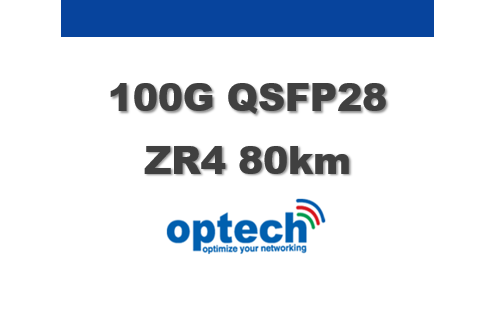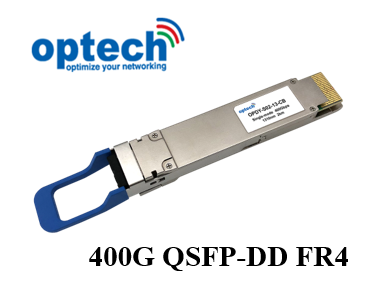Complete Guide to 100G QSFP28 Optical Transceivers and Cables
The 100G optical transceivers series include different form factors such as CFP, CFP2, CFP4, CXP and QSFP28. The CFP, C Form-factor Pluggable was the first 100G optical transceiver to be developed. The newest 100G QSFP28 technology allows to reduce considerably the cost of moving to a 100G network and thus facilitating the adoption of the 100G as a new standard for the data center market. The name of the 100G QSFP28 comes from the fact that its electrical interface can handle four channels of 25G each, potentially up to 28G. [Q stands for Quad, which means 4]. The QSFP28 has better performance and is smaller than all its C form-factor predecessors.
Four Technologies
Four different technologies can be found among the 100GBase QSFP28 family: Multi-mode Transceivers, Single-mode Transceivers, Direct Attached Cables and Active Optical Cables. Of course, each technology has its advantages and inconveniences. In this article, we are going to introduce each technology to help you select the most suitable 100G QSFP28 connectivity for your network.
Multi-mode Transceivers
Multi-mode transceivers are the low cost transceivers. QSFP28 SR4 use more expensive non-standard MPO connectors which cancel out some of the cost savings of the multi-mode transceiver.
100G QSFP28 SR4
The 100GBase QSFP28 SR4 transceiver supports connections of up to 100 meters over multi-mode fiber and uses MPO connectors. The wavelength is 850nm. The short range (SR) transceiver is the most cost effective solution to upgrade to a 100G network.
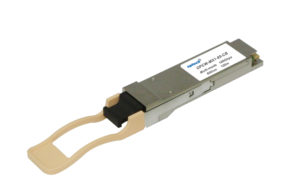
Single-mode Transceivers
Single-Mode transceivers are more expensive than multi-mode transceivers but they allow to reach longer distance and most of them are using standard LC connectors.
100G QSFP28 CWDM4
The 100GBase QSFP28 CWDM4 transceiver supports connections of up to 2km over single-mode fiber and uses standard LC connectors. The CWDM4 uses the FEC (Forward Error Transmission) technology that allows the receivers to correct the errors without needing to request retransmission of data.
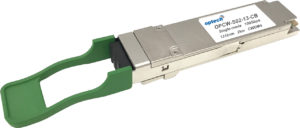
100G QSFP28 BIDI CWDM4
The 100G QSFP28 Bidi CWDM4 transceiver supports connections up to 2km over single-mode fiber and uses LC connectors. The wavelengths are 1271 nm, 1291 nm, 1311 nm and 1331 nm.
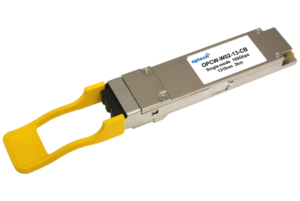
100G QSFP28 CLR4
The 100GBase QSFP28 CLR4 is very similar to the 100GBase QSFP28 CWDM4. The main difference is that the CLR4 can be used with FEC and without FEC, while the CWDM4 can only be used with the FEC technolgy. The QSFP28 CLR4 supports connections of up to 2km without FEC and up to 10km with FEC over single-mode fiber It uses standard LC connectors.
100G QSFP28 PSM4
The 100GBase QSFP28 PSM4 transceiver supports connections up to 2km over single-mode fiber and uses non-standard MPO connectors. The wavelength is 1310nm.
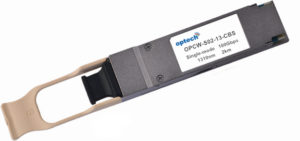
100G QSFP28 LR4 DBF
The 100GBase QSFP28 LR4 DBF transceiver supports connections up to 10 km over single-mode fiber and uses standard LC connectors. The wavelength is 1310nm. DBF means Distributed-Feedback laser diode.
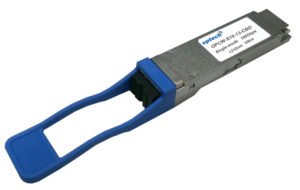
100G QSFP28 LR4 EML
The 100GBase QSFP28 LR4 EML transceiver supports connections up to 10 km over single-mode fiber and uses standard LC connectors. The wavelength is 1310nm. EML means Electro-absorption Modulated Laser, it provides better performance than the DBF technology, espacially for longer distance and higher data rate, thus the QSFP28 LR4 EML is more expensive than the QSFP28 LR4 DBF.
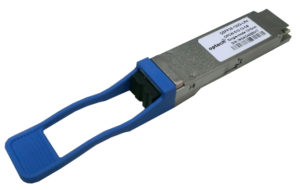
100G QSFP28 LR4 Dual Rates
The 100GBase QSFP28 LR4 Dual Rates transceiver supports a 100 and 112G data rate connections up to 10 km over single-mode fiber and uses standard LC connectors. The wavelength is 1310nm.
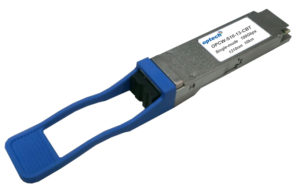
100G QSFP28 ER4
The 100GBase QSFP28 ER4 transceiver supports connections up to 30 km over single-mode fiber without the FEC technology and it can reach up to 40km with the FEC technology. The QSFP28 ER4 uses standard LC connectors and its wavelength is 1310nm.
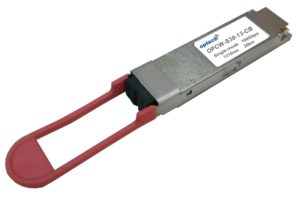
100G QSFP28 ZR4
The 100G QSFP28 ZR4 supports connections of up to 80 km over single-mode fiber and uses Duplex LC connector. The wavelengths is 1310nm. It is compliant with the QSFP28 MSA.
Direct Attached Cables (DAC)
Direct Attached Cables are a very common method used for very short-range distances because of the their low-cost. Indeed, they are the cheapest solution to connect 40G equipment. In addition, it is a one part product instead of the usually three part solution ( two transceivers and a cable), which reduces the problems associated with dirty connectors. DAC also consume less power compared to Active Optical Cables (AOC).
There are two types of DAC, the passive copper cable for distance from 0 to 5 meters and active copper cable for distance from 5 to 15 meters.
100G QSFP28 to QSFP28 DAC
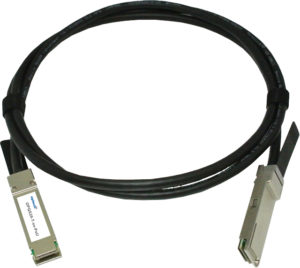
100G QSFP28 to 4 x 25G SFP28 fanout DAC
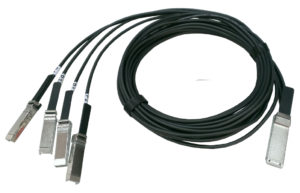
Active Optical Cables (AOC)
Active Optical Cables are comparable to using transceivers and separated cables. They can reach longer distance than DAC, up to 100 meters. They also are lighter and smaller than DAC.
100G QSFP28 to QSFP28 AOC
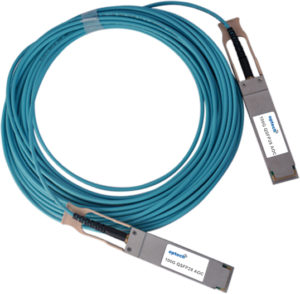
100G QSFP28 to 4 x 25G SFP28 fanout AOC
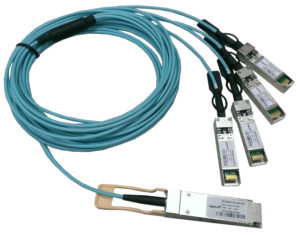
Resume
| Technology | Standard | Optech Part Number | Features |
| Multi-Mode Transceivers | 100G QSFP28 SR4 | OPCW-MX1-85-CB | 850nm, MPO, 100 meters |
| Single-Mode Transceivers | 100G QSFP28 CWDM4 | OPCW-S02-13-CB | 1310nm, LC, 2km, FEC |
| 100G QSFP28 BIDI | OPCW-W02-13-CB | 1310nm, LC, 2km | |
| 100G QSFP28 CLR4 | OPCW-S10-13-IT | 1310nm, LC, 2km/10km, non-FEC/FEC | |
| 100G QSFP28 PSM4 | OPCW-S02-13-CBS | 1310nm, MPO, 2km | |
| 100G QSFP28 LR4 DBF | OPCW-S10-13-CBD | 1310nm, LC, 10km, DBF | |
| 100G QSFP28 LR4 EML | OPCW-S10-13-CB | 1310nm, LC, 10km, EML | |
| 100G QSFP28 LR4 Dual | OPCW-S10-13-CBT | 1310nm, LC, 10km, Dual Rates | |
| 100G QSFP28 ER4 | OPCW-S30-13-CB | 1310nm, LC, 30km (non-FEC), 40km (FEC) | |
| 100G QSFP28 ZR4 | OPCW-S80-13-CB | 1310nm, LC, 80km (FEC) | |
| Direct Attached Cables | QSFP28 to QSFP28 DAC | OPQS28-T-XX-PE | xx= 0,5 to 5 meters |
| QSFP28 to 4 SFP28 DAC | OPQS28-T-XX-P/SF28/4 | xx= 0,5 to 5 meters | |
| Active Optical Cables | QSFP28 to QSFP28 AOC | OPQS28-F-XX-AK | xx= 1 to 100 meters |
| QSFP28 to 4 SFP28 AOC | OPQS28-F-01-A/SF28/4 | xx= 1 to 100 meters |
Optech products are compatible with all major switches and servers brands. You can check all the compatible lists here.
About Optech
Optech Technology Co. Ltd was founded in 2001 in Taipei, Taiwan. The company was created with a sole purpose, to provide a wide and high quality portfolio of optical products to a very demanding and fast evolving market.
To respond to the permanent increase of IP traffic, Optech portfolio is constantly growing. Since the beginning, the company has always been up to date with the latest innovations on the market. Today, we are proud to deliver a large selection of 25G SFP28, 40G QSFP+, 100G QSFP28 and 400G QSFP-DD optical transceivers and cables.
Optech has a large portfolio of products which include optical transceivers, direct attach cables, active optical cables, loopback transceivers, media converters and fiber patch cords.
Through its large selection of optical products, that have a range of data speed from 155 Mbps to 400 Gbps and reach distances up to 120km, Optech products are suitable for various industries such as telecom, data centers as well as public and private networks.
Optech also has a strong experience as an OEM supplier. We put our expertise and knowledge at the service of your brand.
To ensure the quality and the compatibility of our products, every product is carefully tested before delivery to our customers. In addition, Optech obtained several certifications such as UL, TUV Rheinland, ISO9001 and ISO14001 certification. All our optical transceivers are MSA and RoHS compliant.
At Optech, we value each and every customer. We know every demand is unique. For this reason, our team of experts is glad to answer all our customers’ specific demands.
Just like data, Optech has no boundaries and will optimize your network all over the world.
For more information you can visit www.optech.com.tw or contact us at sales@optech.com.tw.
Others Complete Guide
Complete Guide to 10G Optical Transceivers

